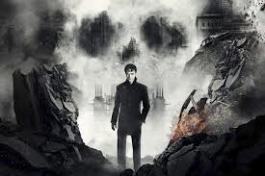Jamie Lloyd’s production of Macbeth is the inaugural play in a season of work for Trafalgar Transformed at the Trafalgar Studios and it’s a brutal, intense, powerful and physical piece of theatre that’s restless and electric from the minute the three witches emerge from trap doors.
The ‘stage’ is a post-apocalyptic vision – all upturned metal chairs and utility tables; the characters in filthy army fatigues – in a non-determined time that could be the near past or near future. It was very 28 Days Later; the starkness adding its own neurosis to Shakespeare’s play about the occult and the blood-thirsty and power-hungry.
Shakespeare, of course, doesn’t need histrionics to stir the emotions and get the heart thumping, but the savagery of the newly configured stage and the physicality of this production sidelines the hocus pocus and brings out the bloodiness and horror behind the witches and ghostly daggers.
This has been billed as a James McAvoy vehicle, but it’s far more than that. If anything, McAvoy threatens to be overshadowed by both the powerful staging and the other actors. There’s been some debate (well, an article in The Independent) as to whether McAvoy is too young to play Macbeth. Shakespeare never specifies his age, but the character has traditionally been played by those in their late 30s or older. McAvoy – and his partner in crime Claire Foy as Lady Macbeth for that matter – might not be too young, but they look it, and their baby faces do make it harder to believe that these are two power-hungry tyrants who go around thrusting daggers through children’s heads. But while McAvoy might not quite convinced as a warrior, he does mad very well, writhing on tables and spitting out his demons with a rabid intensity.
Lady Macbeth has become shorthand for the ultimate malevolent wife, but she’s not purely evil. An ambiguous character, she’s a woman who begs to be bad, but ultimately isn’t bad enough – the last remaining speck of goodness is what ultimately leads to her demise. Still, she’s manipulative enough to persuade her husband to kill the King of Scotland while many women can’t even persuade their partners to make them a cup of tea so she’s no sweetheart.
The super slight Foy though, doesn’t look like a grand manipulator and I’m not sure whether it was her youthfulness that meant I didn’t quite believe in Foy as Lady Macbeth. A great angsty actress, Foy rather struggled to fill Shakespeare’s great villaness’ well-worn shoes, never quite seeming powerful and strong enough for a woman who could encourage her husband to commit regicide. For an actress who usually excels in shouty parts, Foy was at her best during the sleepwalking scene when she caught the vulnerability and fear of the Lady’s
nocturnal stirrings very movingly.
McAvoy and Foy were ably supported by a brilliant cast with standout performances from Forbes Masson as Banquo and Jamie Ballard as Macduff while Allison McKenzie’s brief turn as his about-to-be-murdered wife was eye-catching.
The screams of delight from the adolescents in the audience (of which there were many) is testament to the pull of a Hollywood star, but this is far more than a one-man show.
Macbeth is on at the Trafalgar Studios until 27 April 2013. For ticket information, including £15 Monday tickets, click here.
